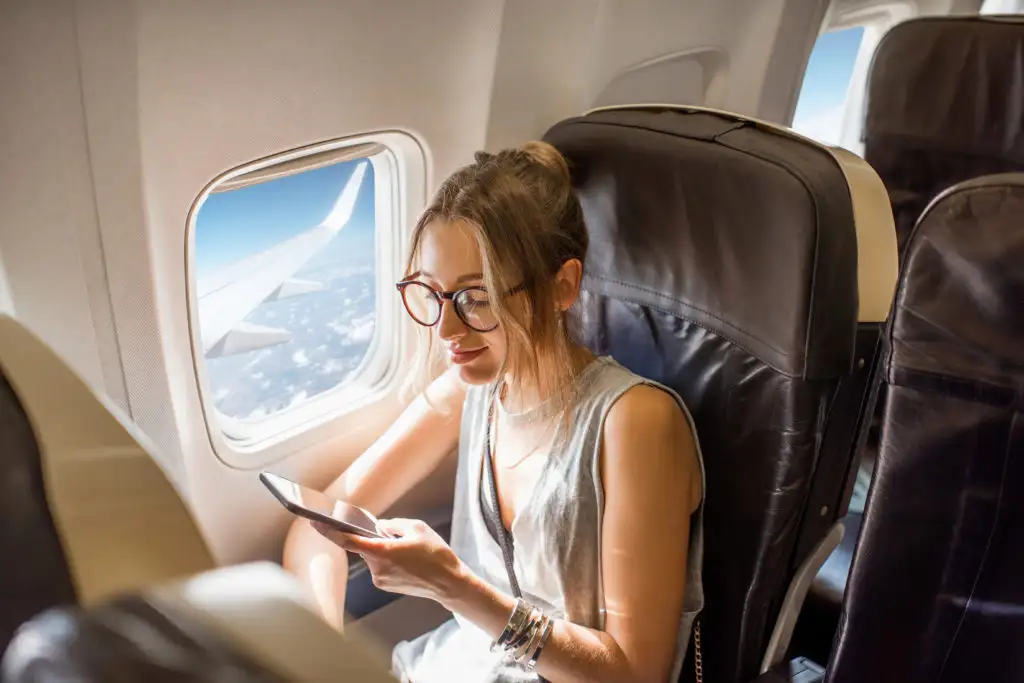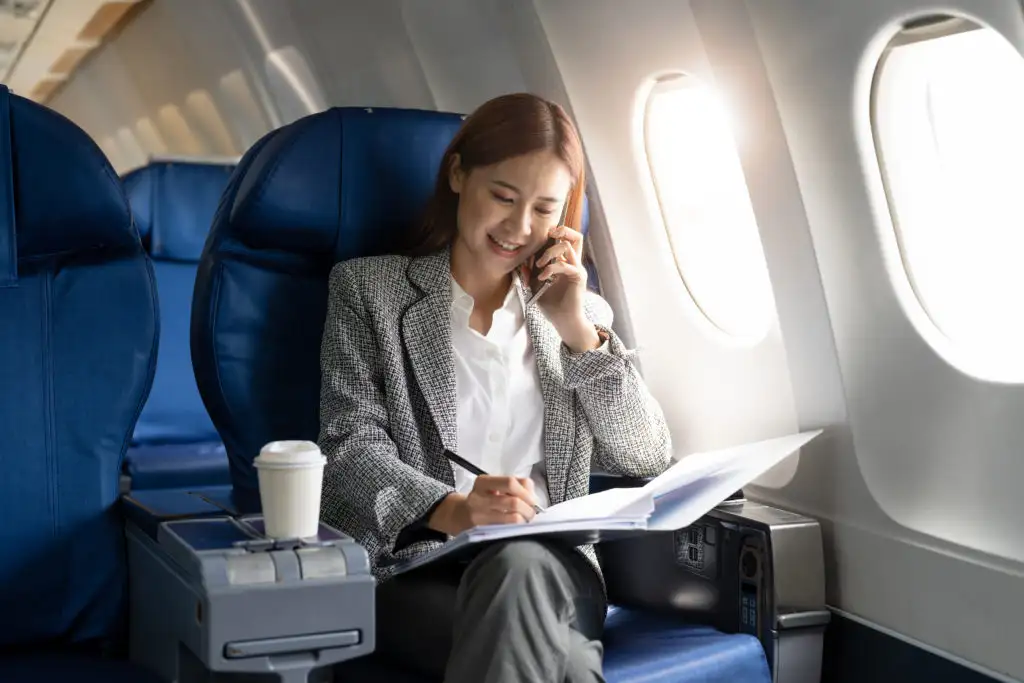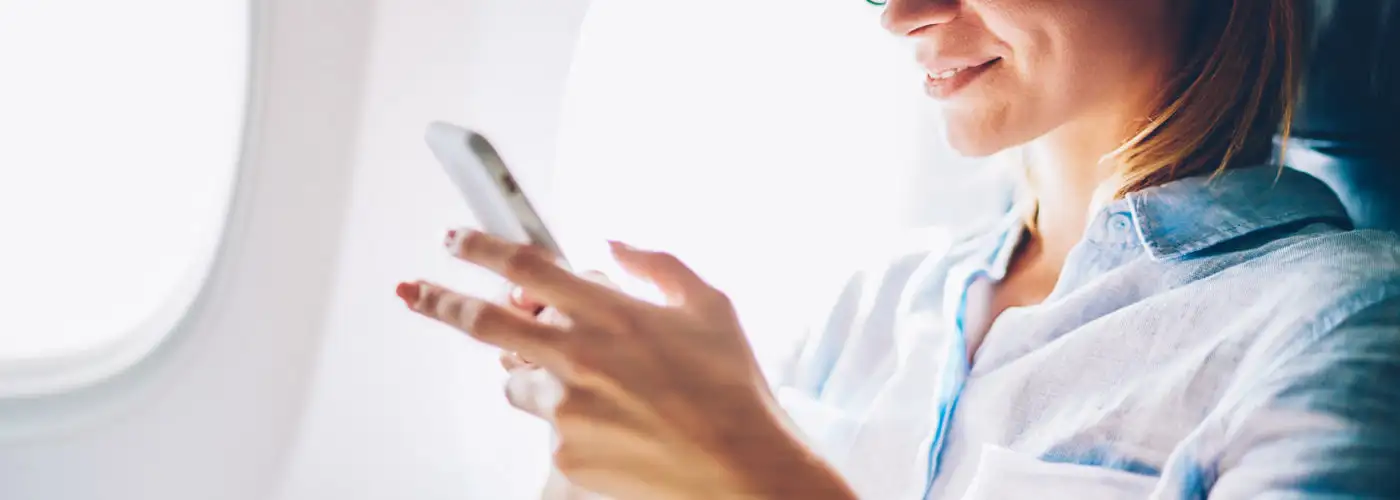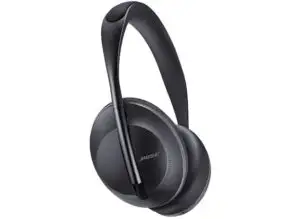It’s a familiar routine: You board the plane, settle into your seat, and then text frantically, trying to eke out just one last message before you hear the flight attendant’s announcement to switch your portable electronic devices to airplane mode.
For now, switching to airplane mode is a federal requirement on U.S. domestic flights. You must disable wireless transmission functions such as cellular voice and data.
But why?
Here’s the answer: Cell phones are designed to send out signals strong enough to reach great distances. According to the Federal Communications Commission (FCC), which originally put the ban in place back in the early 1990s, the radio frequency emitted by these and other electronic devices could interfere with cell tower networks on the ground.
What Happens If You Forget to Turn On Airplane Mode?

If you don’t switch into airplane mode then your cell phone or cellular-enabled tablet will keep attempting to make connections with every cell tower on the ground that the airplane passes.
Not only will the signals cause interference with airplane navigation, but the effort it takes your cell phone to keep scanning and tower hopping at fly-by speeds will also drain your battery and still not maintain a constant signal.
“Cellular does not function as well with the speed and altitude of the plane and so needs an alternate off-aircraft connectivity solution to make it work,” says John Wade, EVP and Chief Operating Officer at Gogo, a technology company that provides in-flight connectivity and wireless entertainment services for Delta, United, and others.
“Wi-Fi usage takes advantage of the aircraft’s off-aircraft connectivity, enabling a better connection and functionality.”
Accessing In-Flight Wi-Fi
Almost all airlines nowadays offer in-flight Wi-Fi, which is made possible because it’s satellite-based and not dependent on cellular tower connections. Almost every domestic airline offers in-flight Wi-Fi but there are only two airlines that offer it for free, JetBlue and Delta.
Through this network, you can surf online, read emails, check social media, or chat using Internet-based messaging apps like iMessage, Facebook Messenger, and WhatsApp. Although you can’t now text with SMS over cellular, you can use Wi-Fi.
And although you can’t now make in-flight voice calls over cellular, you could use Wi-Fi. But U.S. airlines won’t allow it. All domestic carriers prohibit VoIP calls even though many international carriers do not. And what happens to that plane when it enters U.S. airspace? The technology that allows in-flight calling is turned off.
Today, there is more extensive bandwidth and upgraded satellite technology on most airlines around the world, with Qantas and JetBlue among the first to adopt.
In February 2017, Qantas introduced its new in-flight Wi-Fi network using the upgraded technology. Connection speeds increased up to 10 times faster than conventional in-flight Wi-Fi, allowing passengers to stream Netflix, Spotify, and other online content to their personal devices. In following years, more airlines have come out with gate-to-gate connectivity like Southwest, Norwegian, and JetBlue (which also supports streaming services).
And if airlines offer in-flight Wi-Fi, they most likely also allow you to stream video and other media in-flight, but it’ll cost you. Similar to the tiered Wi-Fi plans that you’ll find at hotels, you now see passengers having the option to select a certain speed of Wi-Fi for their inflight plans. The only exception to this is when the airline offers in-flight entertainment on your own device via its app, which is free to stream.
Stay Entertained with Noise-Cancelling Headphones
Whether your flight is one hour or ten, the best way to make the time soar by is by watching pre-downloaded movies, audiobooks, or music with noise-canceling headphones.
The Future of In-Flight Cellular

Over a decade ago the European Commission began allowing in-flight cellular service throughout the EU. Several airlines offer onboard voice calling, data, and texting, while others allow only data and texting. Beginning this past June, flights in the EU have adopted 5G capability, allowing for full albeit slower mobile usage in-flight.
Technically speaking, the service requires that each plane be fitted with its own mobile base station, a network control unit that prevents onboard phone signals from reaching land-based networks and a satellite link to terrestrial phone networks.
The technology has been deployed successfully in Europe and around the world without incident, according to the FCC. It’s available in the United States, too. Some of Gogo’s business aviation customers are already using it, but none of the technology company’s 16 commercial airline customers have requested it.
Over the past several years the FCC collected consumer and technical input as it considered new proposed rules that would give airlines the freedom to allow cellular service if the aircraft is outfitted with the proper onboard equipment. However, it ultimately decided against the proposal in 2020 after strong opposition from flight crew, passengers, and members of Congress.
Do Americans Even Want Voice Calling?
The FCC’s decision seemingly reflects the sentiment of the majority of Americans. A 2018 study commissioned by Turkish Airlines showed that 89% of U.S. respondents were against in-flight voice calls.
Book Your Stay With SmarterTravel Hotels
No matter where you’re flying, find your hotel for a great rate with SmarterTravel Hotels.
Editor’s Note: This story has been corrected to note that the ban on in-flight cellular data use originated with the FCC, not the FAA, and to clarify the reasons behind this ban. This article was written in 2017 and has been updated with the latest information. Some of the links featured in this story are affiliate links, and SmarterTravel may collect a commission (at no cost to you) if you shop through them.
You Might Also Like:
• 6 Ways to Avoid Getting Sick After Flying• Flight Attendants Reveal Their Secrets for a Better Flight
• Luggage Locks: Should I Lock My Suitcase When I Fly?
• 7 Air Travel Secrets You Didn’t Know
• Flying with Gifts: The TSA Rules You Need to Know
We hand-pick everything we recommend and select items through testing and reviews. Some products are sent to us free of charge with no incentive to offer a favorable review. We offer our unbiased opinions and do not accept compensation to review products. All items are in stock and prices are accurate at the time of publication. If you buy something through our links, we may earn a commission.
Related
Top Fares From
Today's Top Travel Deals
Brought to you by ShermansTravel
Shop and Save with Country Inns...
Patricia Magaña
 Hotel & Lodging Deals
Hotel & Lodging Deals
$229 -- Chicago: Discounted Rates and...
Francesca Miele
 Hotel & Lodging Deals
$229+
Hotel & Lodging Deals
$229+
$188 -- Honolulu: Save on Oceanview...
Abigail Lamay
 Hotel & Lodging Deals
$188+
Hotel & Lodging Deals
$188+






